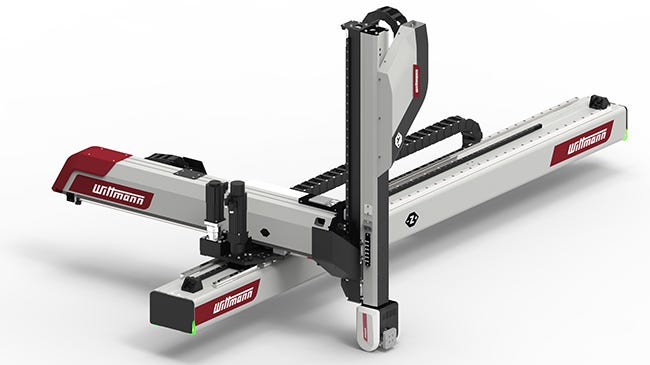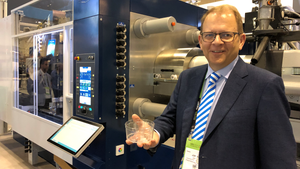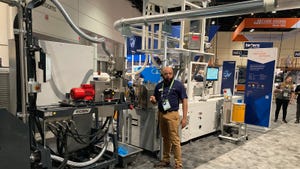Now Showing: Wittmann's 'Virtual Fakuma'
Since Fakuma 2020 has been cancelled because of the pandemic, Wittmann Battenfeld is showcasing product introductions and new technologies that it was going to exhibit at the event via videos on its Virtual Fakuma portal.
September 4, 2020
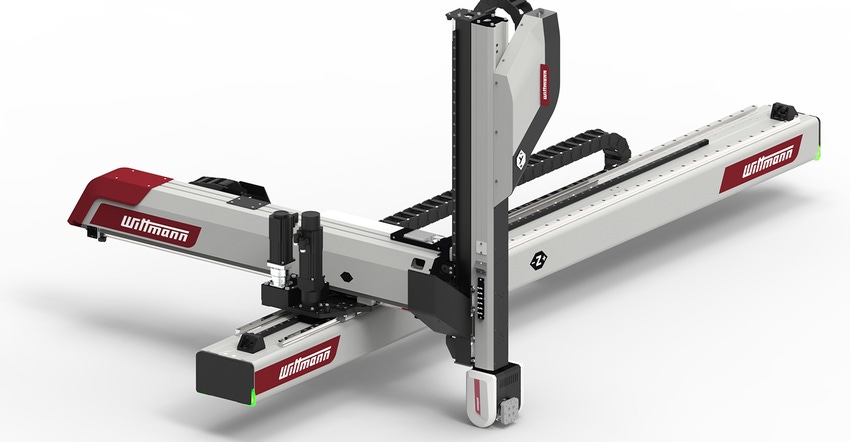
Plastics processing machinery makers face a real conundrum this fall: Many of them have developed new equipment and technologies, which they planned to showcase at Fakuma in Friedrichshafen, Germany, in October. But the trade show has been cancelled because of concerns related to COVID-19, depriving them of a reliable platform to tout their engineering accomplishments. Enter the internet.
Earlier this week, Engel announced that it would hold a virtual trade show in October, and fellow Austrian equipment manufacturer Wittmann Battenfeld said that it plans to upload videos showcasing its new technologies on the Virtual Fakuma portal. The videos will be presented "primarily in personal meetings with customers," said the company, but it will also make them publicly available through its YouTube channel. The videos feature product introductions in automation, recycling, material handling, and temperature control equipment that the company intended to display at its Fakuma booth. Here is a brief overview.
Upgraded automation for injection molding applications
Wittmann has redesigned its WX153 robot for automating injection molding processes in machines with clamping forces ranging from 500 to 1,300 tons. The horizontal Z-axis achieves stroke lengths up to 18,000 mm. For stroke lengths 4,000 mm and up, tandem solutions involving two independently moving robots can be configured. A joint R9 TeachBox can control up to 12 axes simultaneously. Any combination of axes in the individual or tandem robots can be controlled to create movement profiles that will subsequently run synchronously.
|
Wittmann's WX153 robot. All images courtesy Wittmann. |
Another new feature is an integrated compact controller housing. The X-axis for demolding can be delivered with a stroke of 1,200 or 1,400 mm. In its standard configuration, the equipment supports 30-kg load capacity, which can be adjusted to suit the application. The WX153 robot comes with the Wittmann R9 control system that incorporates a digital twin for on-screen test runs and error analyses, as well as SmartRemoval to minimize mold opening times.
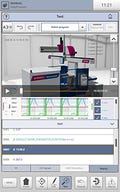 Instant replay comes to the shop floor
Instant replay comes to the shop floor

Slow-motion replays, a staple of sports broadcasts, is now available in Wittmann robots with the R9 controllers. A digital twin is a standard feature in R9 control systems: It records the robot’s axial movements, entrance and exit points, and other relevant data, all of which is displayed on the TeachBox, where the data can be viewed at various speeds.
One practical example provided by Wittmann is what happens when the robot freezes up for an unknown reason. Recording stops, and the previous 100 seconds of operation can be viewed and analyzed. “A time controller installed on the TeachBox makes it possible to define a point in time within the displayed sequence,” explains Wittmann. “This controller can be shifted in both directions, as desired, in order to examine in detail critical changes of status that have occurred.”
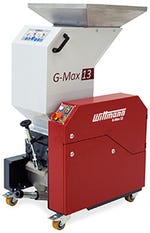
Going into “granulator” detail
The beside-the-press G-Max 13 granulator is designed for inline recycling of soft to medium-hard PP, PE, ABS or PU sprue and is compatible with injection molding machines having clamping forces up to 230 tons.
Material screens with conically shaped perforations measuring 4- and 5-mm in diameter are available to accommodate varying materials and throughputs. The cone shape allows soft and sticky granulate to pass through more easily, minimizing accumulation of material deposits in the openings. The tiltable material hopper simplifies cleaning and servicing of the equipment.
The G-Max 13 can process 35 kg of material per hour, depending on the shape of the parts or sprues, screen size, and material quality.
Complete control with the M8-IPC
The next generation of the M7-IPC control system, the CAN-bus-based M8-IPC simplifies control of complex installations, according to Wittmann.
Programmable modules support queries, counting functions, loops, and more to enable logical switchovers. Other new features include:
coded regrind recycling, by which regrind coming from different granulators is transported unmixed to separate containers to prevent different types of regrind being processed together;
recovery of residual materials that are conveyed back to their source when production has been interrupted, preventing material from staying in the machine and causing startup issues when production resumes.
A dry heat
Since the introduction of the CARD series compressed air dryers in April 2020, the CARD 6G/FIT, CARD 10S, and CARD 20S sizes have been especially popular, according to Wittmann. Drying temperatures are set via a touch screen, and at the end of the pre-drying phase, a signal releases automatic production startup.
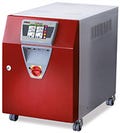
Compressed air consumption is precisely adjusted to suit demand by an intelligent digital air-volume control system in the CARD S models. Using a material loader to fill the dryer ensures continuous material supply, and the dryer automatically adjusts the temperature, as needed.
The Tempro plus D120 temperature controller, available in single- and dual-circuit versions, has a direct cooling capacity of 80 kW with a Delta T of 75°C as standard. The standard heating performance of 9 kW can be increased to 12 or 16 kW, if a higher production temperature is required. Stainless-steel pumps with wear-free magnetic couplings accommodate maximum flow volumes ranging from 40 to 90 L/min.
About the Author(s)
You May Also Like

